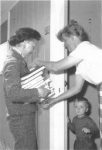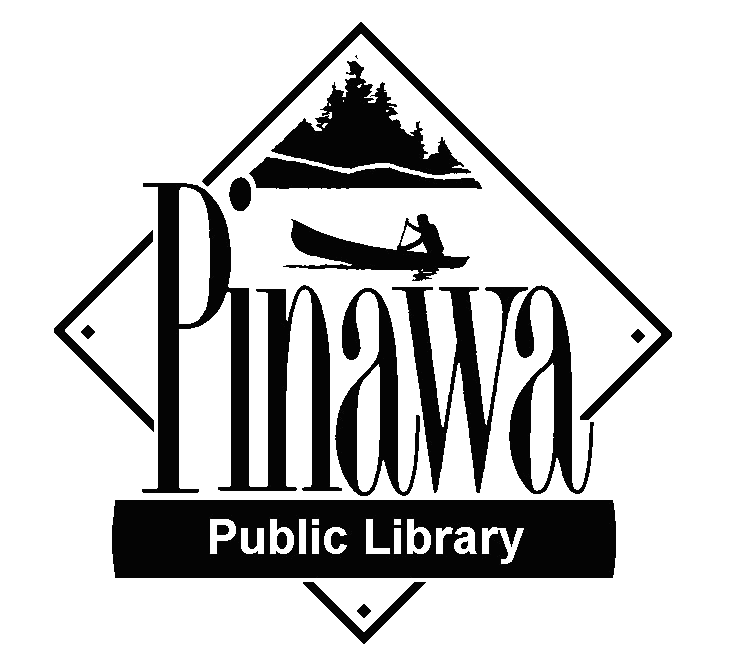BIRTH OF A LIBRARY
by
Helen Tomlinson
“Just change that ‘they’ to ‘I’ or ‘we’ and you’ll have the answer”, said my husband.
We had just returned home from an information meeting and get-together with other families who would soon be moving from Deep River to Pinawa, the Company’s brand new town …way out in Manitoba! I wasn’t thinking too much about the initial drawbacks involved in the move. Limited access to services like banking , shopping and recreation hadn’t really engaged my attention… yet. What did clutch at my heart, though, was how would I survive without something to read? With no stores and no library, how could ‘they’ (the Company? Somebody? Anybody?) expect us to survive a long, cold winter in isolation without books???!!
“What are THEY going to do about it?” I demanded. Mike repeated “Just change ‘they’ to ‘I’ or ‘we’.”
The next day I went to talk to Dorothy Robertson. She in turn telephoned Bunny Putnam, who spoke to Gladys Guthrie, who contacted Marg Smith who called Mari-Ann Weeks, and so on. We decided to advertise in the local paper and ask for donations of books. ”Just give us a call and we will be happy to pick up any of your old paperbacks or old books of any kind”, went the ad. The response from the community was amazing. Boxes and boxes of books made their way into the homes of those of us who would soon be heading west to Pinawa.
Deep River librarian, Joy Herringa, greeted our request for material with enthusiasm. Her library was crammed to overflowing and she was ready for a big clean up in order to make way for new items. Dr. Lewis, long time supporter of the Deep River library, treasured its collection and was reluctant to part with anything. He was, however, seduced by the idea that the Deep River Library could help found a new library in Pinawa and so he gave his blessing to the librarian’s projected clean-up.
 AECL would pay expenses for families moving from Deep River to Pinawa, but how would we cover the cost of sending all these books? The problem was quietly resolved. We were told to distribute the boxes of books among those of us making the move during that summer of 1963. These boxes would simply be treated as family household items. And so Pinawa’s infant library was delivered to the new town in the form of many, many cardboard boxes full of dusty books travelling side by side with beds, lamps and teddy bears.
AECL would pay expenses for families moving from Deep River to Pinawa, but how would we cover the cost of sending all these books? The problem was quietly resolved. We were told to distribute the boxes of books among those of us making the move during that summer of 1963. These boxes would simply be treated as family household items. And so Pinawa’s infant library was delivered to the new town in the form of many, many cardboard boxes full of dusty books travelling side by side with beds, lamps and teddy bears.
Photo: Mari-ann Weeks, watched by young son Andy, receiving a delivery of books.
Photo by Jac Holland, Deep River Ontario
Ed Lundman greeted the arrival of our strange library with enthusiasm. He was immediately helpful and continued to support the growing library in every way he could. Ed was the Administrator of the Local Government District of Pinawa. This meant that he wore many administrative ‘hats’. He was Mayor and Council and School Superintendent and supervisor of just about everything else all rolled into one. As soon as space was available in the new Gilbert School, our boxes of books were given a home in an empty room (no shelves). There were few permanent residents in town as yet, so Phase 1 of Library Services was casual to say the least. If you fancied something to read, you’d sashay round to the school and rummage around in one of the many boxes looking for anything that might catch your attention. It was a lucky dip.
In addition to having no shelves and no money, we didn’t have a real ‘librarian’ among us. Still, the early arrivals to Pinawa seemed to feel an attachment to this chaotic ‘library’, partly because there were few, if any, other organizations or clubs operating in town to fill their time. Hence many volunteers appeared who were prepared to invest considerable time and effort into organizing this mess.
In order to address the lack of funding in those first few months we resorted to basic money raisers such as bake sales and selling Christmas trees. Standing outside on the Christmas tree lot one evening, with the temperature marking what felt like at least 1,000 degrees below zero, the revelation struck that these kinds of efforts would raise barely enough money to buy a good book or two and certainly not enough to support a library. At that time there were no libraries in the nearby towns, although a Manitoba Public Library
Bookmobile came around. The selection of books here was limited. We were invited to request any item that might be of interest but the waiting time was long and this arrangement precluded browsing for something that might take your fancy.
Ed Lundman stepped in to suggest that we apply to the province for library funding. If our request were approved, the funding would meet our needs for the establishment of a real library. In order to ensure provincial approval, he counselled that we first circulate a petition approving an increase in the mill rate. The petition asking residents to support a tax increase for the purpose of funding a library met with overwhelming town support.
Armed with our petition results Ed and I went to Winnipeg for an appointment with the Provincial Librarian. The Provincial Librarian was understandably curious about this hitherto unknown town and perhaps even a tad suspicious of a place which had barely begun to exist. In the course of our chat with her she was impressed with the efforts we had made to start our library and very gratified with the results of our petition. Our Town Administrator (Ed) was able to confirm that the new Public Library would be housed permanently in the new High School / Community Centre, currently being completed, and that it would serve both the High School as well as the Community of Pinawa; there would be more than enough volunteers to staff the library throughout the week and public access to the books would pose no problem.
The Librarian’s response, to our great delight, was to confirm the necessary funding. She was quick to reassure us that Library Services would make the book selection on our behalf and that the books would be sent to us catalogued and ready to lend. New selections would be made as and when we’d exhausted the first lot and so on. Of course we could submit special requests and they would try to accommodate us.
For a moment we were speechless. Knowing we had the funding was wonderful. The second part came as a shock. It hadn’t occurred to us that we wouldn’t be making our own selection of materials. Pinawa had eager readers and volunteers planning on making their own selection of books for the town. As gently as possible we explained that we would prefer to undertake our own book selection. Our readership represented a very wide range of tastes. There was a big requirement also for non-fiction material unlikely to be addressed by Library Services.
It was the Librarian’s turn to be speechless. If Pinawa was set on being independent, doing all its own ordering as and when it felt like it, then it would have to look after cataloguing its own accessions. This Pinawa didn’t even have one qualified librarian to its name. It would be an impossible situation! We demurred. We could learn how. Please let us try. A truce was called. It was with reluctance that the Librarian agreed both to our funding and to permitting us to go it alone. She was sure in her heart that within the year, possibly even in a few months, we would be back with a big mess for them to sort out and begging for their help.
And so began the next phase of the library’s development. To the relief of the messengers (Ed and me), all the Pinawa volunteers agreed that the independent route was absolutely the way to go. They pulled together and faced the challenge of learning how to catalogue the collection we already had. For a short time we had the advice of Eva Sutherland, a qualified librarian but she did not remain long in Pinawa. In addition to those first on the scene, I remember others who gave hours of their time: Sheila Dyne (we’d have been lost without her), Sheila Hilborn, Rowe Lundman, Bea Mathers, Alice Mooradian …. The first Library Board (made up of Ed Lundman, John Minton, Helen Tomlinson, Dick Tuxworth (chair), Eyfie Walterson and Mari-Ann Weeks) was appointed to direct the operation of the library. Many more volunteers came out on a regular basis to give out books, replenish the shelves, repair damaged books, shelf read, select new materials and serve on the Library Board. Finally it became apparent that the library needed to employ someone regularly who would provide continuity and take on the business of ordering and accessioning new material.
Enter Edna Graham. Edna was the sole daytime Library employee for many years. She brought love and dedication to the job and, together with Barb Sabanski and Linda Swiddle who supervised evening hours, kept our library running smoothly. This sums up the early period during which the library was established. The Pinawa Public Library has, without a doubt, the finest volunteers one could wish for. Without them the library would never have come into existence. It would not have continued to exist without regular employees like Edna (retired), Brenda Johnson (now living in Switzerland) and Marg Stokes who have provided the glue to make it all hang together.
Over the years, under the direction of the Board, volunteers all, the Pinawa Public Library has grown and changed with the times. It continues to come up with improvements and refreshing new ideas. For example, next time you’re in, look at the hand-painted signs and artwork on the walls, courtesy of the high school art class, and keep your eyes open for special contributions from the younger school children. The Library continues to exert its independence. Our collection of books, videos and audio books is growing, thanks to the efforts of our book selection committees. Extra funding, generated through raffles and other activities, allow us to have special presentations over the cold winter months – like author readings, selections by the school choir and information on new and unusual hobbies. The Library provides employment for librarians and summer students and an outlet for our many volunteers. Over the years, our volunteer base has been solid, stable and enthusiastic and is the envy of town libraries across the province. “We” and our Library are an ongoing success story.
